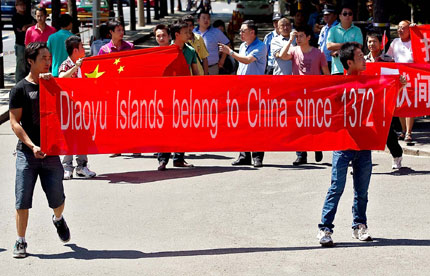Protests following Japanese landing on Diaoyu Islands
 0 Comment(s)
0 Comment(s) Print
Print E-mail Xinhua, August 20, 2012
E-mail Xinhua, August 20, 2012
China has expressed its strong objection to Japanese rightists landing on the Diaoyu Islands yesterday, and is urging an end to actions that seek to undermine its territorial sovereignty.
 |
|
Protesters hold up banners and Chinese flags outside the Japanese Embassy in Beijing in protest at the landing of a group of Japanese nationalists on one of the Diaoyu Islands in the East China Sea. |
Foreign Ministry spokesman Qin Gang said the illegal actions of the Japanese had violated China's territorial sovereignty, and senior ministry officials had lodged solemn representations to the Japanese ambassador to China.
"The Japanese side should properly handle the current issue and avoid seriously damaging the overall situation of China-Japan relations," Qin said.
A total of 150 Japanese politicians and members of right-wing groups went to waters around the Diaoyu Islands to mourn soldiers who died in World War II, and 10 of them landed on the Diaoyu Islands yesterday morning.
In a number of Chinese cities, people took to the streets in protest at the landing, including in the southern city of Shenzhen where small groups of demonstrators overturned cars of Japanese brands and shouted slogans denouncing Japan's claims over the islands.
In Shenzhen's downtown area, protesters gathered at the SEG Plaza at around 9am, holding Chinese national flags and shouting about defending China's territory before they began a march along major roads.
By 11am, about 1,000 protesters had gathered and tempers flared as a Japanese restaurant was damaged and a Chinese police car, a Japanese model, was overturned. Police are investigating both incidents.
No casualties were reported and by 2:15pm the protesters had dispersed.
In Beijing, several demonstrators protested near the Japanese Embassy, continuing protests there since last Wednesday.
They held signs reading, "Return our Diaoyu Islands" and "Safeguard the Diaoyu Islands."
More than 100 protesters gathered near the Consulate-General of Japan in Guangzhou, capital of Guangdong Province, holding Chinese national flags and banners reading: "Defend China's territory over the Diaoyu Islands." They also shouted: "Japan, get out of the Diaoyu Islands!"
At 9:40am, they began marching through the city, returning to the consulate at around 10:30am, where some staged a sit-in at the gate of the compound.
The crowd had dispersed by early afternoon.
In Harbin, in northeast Heilongjiang Province, hundreds gathered at Dragon Tower Square, a city landmark.
The protest had been organized online, and some local residents were lending support by giving protesters Chinese flags and drinking water.
A march along the city's major roads was led by two cars flying Chinese flags with more people joining the march as it went on.
In the capital of northeast China's Liaoning Province, about 100 protesters gathered at a square near the Shenyang city government building and marched to the Consulate-General of Japan. Some wore clothing bearing the Chinese characters for "China."
In Hangzhou, in southeast Zhejiang Province, several hundred people gathered near Wulin Square in the city's central business district with pictures of the Diaoyu Islands printed on banners.
At around 9:30am, they began to march, shouting: "Return the Diaoyu Islands to us!" More people, mostly students and the elderly, joined the protesters as they marched.
In Ji'nan, in east China's Shandong Province, more than 2,000 protesters marched toward Donghuan Plaza singing China's national anthem as they held up banners and national flags.
They also used the demonstration to speak out against Japan's two-day detention of Chinese nationals after they arrived at the Diaoyu last Wednesday to assert China's sovereignty over the islands.
At 10am, more than 1,000 protesters in the coastal city of Qingdao in Shandong Province marched toward the Consulate-General of Japan there.
"Get out of the Diaoyu Islands!" they shouted. "Defend China's sovereignty over the islands!"
In Taiyuan, in north China's Shanxi Province, more than 1,000 people marched on Yingze Street, one of the city's main thoroughfares.
There were also protests in other cities, including Chengdu, Zhengzhou, Changsha and Guiyang.





